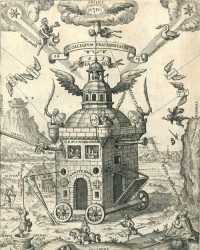Magic
From The Art and Popular Culture Encyclopedia

Illustration: The Temple of the Rose Cross from the Speculum Sophicum Rhodostauroticum (1618) by Teophilus Schweighardt Constantiens
|
"To establish contact with the mysterious forces which rule the world, to come to terms with them, to obtain their co-operation or complicity, such is the objective of all those who devote themselves to magic and to whom, rightly or wrongly, people attribute supernatural powers and a special gift of receptivity to everything marvellous."--A Pictorial History of Magic and the Supernatural (1961) by Maurice Bessy "If we substitute mechanics for magic as the operative force used by the Creator, Dee's religion was perhaps not altogether unlike that of Isaac Newton."--Theatre of the World (1969) by Frances Yates "See the apology by Naudé, for great men accused of magic. The author there thinks himself obliged to prove that Homer, Virgil, Zoroaster, Orpheus, Democritus, Solomon, pope Sylvester, Empedocles, Apollonius, Agrippa, Albertus Magnus, Paracelsus, &c. never were sorcerers."--A Treatise on Man: His Intellectual Faculties and His Education (1810) by Helvetius "The enemies of learning are the bonze, the dervise, the bramin, in short, every priest of every religion. In Europe the priests rose up against Galileo; excommunicated Polydore Virgil and Scheiner for the discovery which the one made of the antipodes, and the other of the spots in the sun. They have proscribed sound logic in Bayle, and in Descartes the only method of acquiring knowledge ; they forced that philosopher to leave his country; they formerly accused all great men of magic; and now magic is no longer in fashion, they accuse those of atheism and materialism, whom they formerly burned as sorcerers."--A Treatise on Man: His Intellectual Faculties and His Education (1810) by Helvetius |
|
Related e |
|
Featured: |
Magic may refer to:
- Black magic
- Magic (paranormal), a term for various supernatural, mystical, and paranormal practices.
- Magick, a variant term popularized by Aleister Crowley
- Magic in the Greco-Roman world, a branch of the disciplines of Classics, Ancient History and Religious Studies that has become a popular object of study especially in the last twenty years or so
- Magic (illusion), also known as stage magic, street magic, and sleight of hand; the art of entertaining audiences by performing illusions and tricks.
History
The history of magic extends from the earliest literate cultures, who relied on charms, divination and spells to interpret and influence the forces of nature. Even societies without written language left crafted artifacts, cave art and monuments that have been interpreted as having magical purpose. Magic and what would later be called science were often practiced together, with the notable examples of astrology and alchemy, before the Scientific Revolution of the late European Renaissance moved to separate science from magic on the basis of repeatable observation. Despite this loss of prestige, the use of magic has continued both in its traditional role, and among modern occultists who seek to adapt it for a scientific world.
Etymology
From Middle French magique (noun and adjective), from Latin magicus (adjective), magica (noun use of feminine form of magicus), from Ancient Greek μαγικός (magikos, “magical”), from μάγος (magos, “magus”). Displaced native Middle English dweomercraft (“magic, magic arts”) (from Old English dwimor (“phantom, illusion”) + cræft (“art”)), Old English galdorcræft (“magic, enchantment”), Old English drȳcræft (“magic, sorcery”).
See also
- Magical thinking
- Magician
- Magic and religion
- Magic realism
- Magic in fiction
- Magus, a Zoroastrian priest; the origin of the word magic
- Magic mushroom
- History of magic
- Timeline of magic


